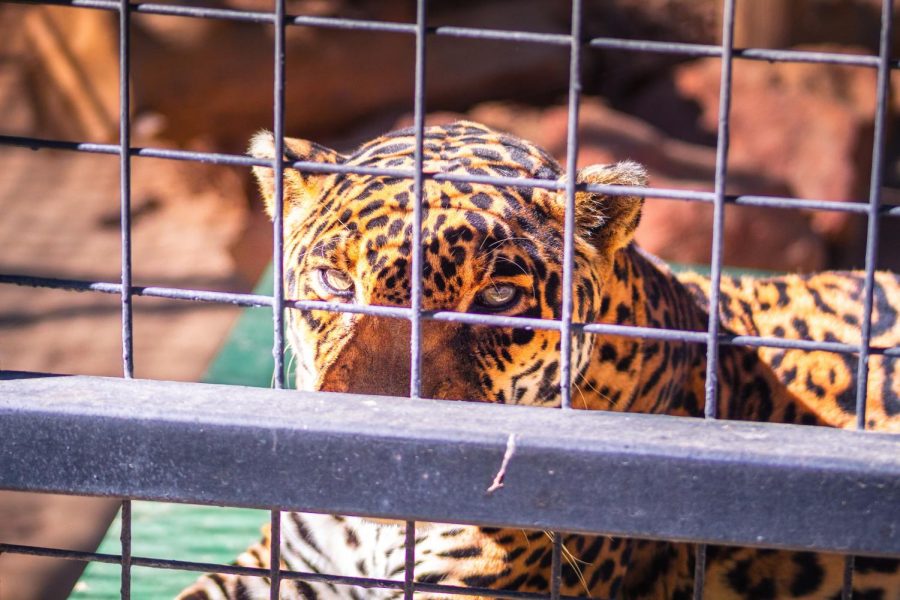Exploitation and Ethics: The Immorality of Zoos
Some of the most cherished childhood memories come from those leisurely days spent at the zoo. Every day, zoos and aquariums across the country host thousands of people who crowd around each exhibit to watch the animals. Unfortunately, the public tends to overlook the more sinister side of their beloved zoos. While I do feel that zoos are entertaining places to spend time with family and friends, it is important to expose the disturbingly unethical aspects of zoos, and the detriment they inflict upon the animals living there. Taken from their original homes, put in the middle of our urban neighborhoods, and enclosed in small, artificial spaces, animals in zoos are exploited for our own selfish enjoyment. Knowing this, we are left with this impending question: is an occasional day at the zoo worth keeping animals in a state of perpetual captivity?
Animals have had disturbing reactions to being put in zoos. In the environmental author, Emma Marris’ New York Times article “Modern Zoos Are Not Worth the Moral Cost,” she addresses the many ethical problems regarding modern zoos. Harris writes that researchers have divided the odd behaviors of captive animals into two categories: impulsive/compulsive behaviors and stereotypies. Impulsive/compulsive behavior is exemplified by coprophagy (eating feces), regurgitation, self-biting/mutilation, exaggerated aggressiveness, and infanticide. Stereotypies are shown through constant repetitive movements. For example, animals in captivity have been documented to develop tics, like rocking back and forth, pacing and pulling out hair. Though many argue that the supportive environment of a zoo keeps the animals safe from the rough conditions of the wild, I have to disagree. When an animal lives in a zoo, its familiar and natural ways of life fade away. It no longer needs to hunt or gather, and its innate self-preservation skills become a buried memory and a forgotten instinct. The idea that a zoo is a relatively clean and safe environment cannot and should not justify the fact that zoos confuse and essentially destroy an animal’s natural way of living.
Zoos can definitely be well-kept, and their employees gentle and ardent. Zookeepers are expected to care for the animals, tuning in to their needs and supplying them with food and activity. Although most zoos fulfill these crucial requirements, some fail to do so. At the end of the day, zoos (along with every other sector of industry), have one primary motivation, which is profit. White tigers are very beautiful, especially rare, and almost extinct. The origins of these white tigers are actually quite unsettling; white tigers have been continuously inbred, with the sole purpose of increasing tourism within zoos and engaging in illegal trade. This has led to horrific physical and biological defects appearing in these tigers, and consequently, their lifetimes have shortened. This is nothing short of unethical. Animals are often left in the hands of corporations that are willing to sacrifice the animal’s health to make a profit off of them.
Gabriela Cowperthwaite’s critically acclaimed documentary, Blackfish, exposes the abuse and exploitation of killer whales at Seaworld parks all across the globe. I watched this film last year, and it disturbed me to my core. Before action was taken against the mistreatment, large orcas were kept in pools (equivalent to a human in a bathtub) for years, and staff members at Seaworld would sexually exploit their whales to get them to reproduce. The documentary mainly focuses on one whale, Tillikum, who was captured from Iceland at age 2 and brought to SeaWorld in Orlando. Tillikum was kept in isolation and confinement for 20 years, being trained to perform for shows day in and day out. The whales displayed an increasing amount of aggressiveness and hostility throughout their years in captivity. Several whales eventually ended up severely injuring their trainers. In February 2010, Tillikum killed his trainer Dawn Brancheau during a show. Tillikum was sent to live out the rest of his days in a smaller pool, rarely seen or interacted with by anyone. This tragic story shows how humans’ complete insensitivity and disregard towards animals eventually leads to disaster.
Under no circumstances is it humane to make animals suffer simply because we are curious about them. It is not in any way ethical to exploit animals for the sake of profit or entertainment. Imagine being born and growing up in a museum, or being taken from your home and put in a museum. This is exactly what we are doing to animals by placing them in enclosures that so poorly resemble their real habitats. Though animals may not possess the same cognitive skills as humans do, that does not mean that they are not fully processing what is happening to them. Animals can feel a wide range of emotions. They feel pain to the same extent we do. We are in no position to claim that humans possess more of a moral compass and animals do not. Animals are moral creatures and we should have moral obligations to them. In situations where we capture other living things, put them on display, and let them live out their lives with limited experience makes us oppressors to these powerless beings, and strips us of our own.

Shireen is a junior in the IB program here at Harriton. She is very grateful that she has earned an editorial position for the Banner this year, and she...


